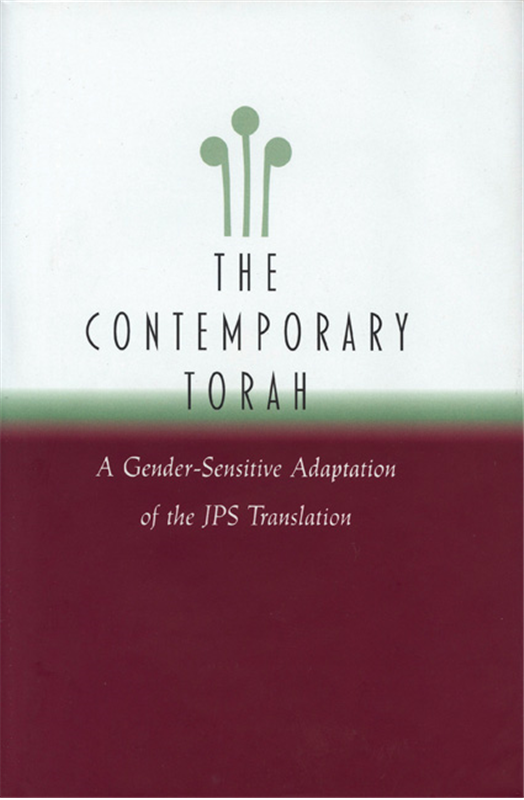About the Book
Offers readers new perspectives on the role gender plays in Bible translation.
This adaptation of the JPS translation of the Torah (1962) will appeal to readers who are interested in a historically based picture of social gender roles in the Bible as well as those who have become accustomed to gender-sensitive English in other aspects of their lives.
Many contemporary Bible scholars contend that the Bible’s original audience understood that the references to God as male simply reflected gendered social roles at the time. However, evidence for this implicit assumption is ambiguous. Accordingly, in preparing this new edition, the editors sought language that was more sensitive to gender nuances, to reflect more accurately the perceptions of the original Bible readers.
In places where the ancient audience probably would not have construed gender as pertinent to the text’s plain sense, the editors changed words into gender-neutral terms; where gender was probably understood to be at stake, they left the text as originally translated, or even introduced gendered language where none existed before. They made these changes regardless of whether words referred to God, angels, or human beings.
For example, the phrase originally translated in the 1962 JPS Torah as “every man as he pleases” has been rendered here “each of us as we please” (Deut. 12:8). Similarly, “man and beast” now reads “human and beast” (Exod. 8:14), since the Hebrew word adam is meant to refer to all human beings, not only to males. Conversely, the phrase “the persons enrolled” has been changed to “the men enrolled” (Num. 26:7), to reflect the fact that only men were counted in census-taking at this time.
In most cases, references to God are rendered in gender neutral language. A special case in point: the unpro-nounceable four-letter name for the Divine, the Tetragammaton, is written in unvocalized Hebrew, conveying to the reader that the Name is something totally “other”—beyond our speech and understanding. Readers can choose to substitute for this unpronounceable Name any of the numerous divine names offered by Jewish tradition, as generations have before our time. In some instances, however, male imagery depicting God is preserved because it reflects ancient society’s view of gender roles.
David Stein’s preface provides an explanation of the methodology used, and a table delineates typical ways that God language is handled, with sample verses. Occasional notes applied to the Bible text explain how gender is treated; longer supplementary notes at the end of the volume comment on special topics related to this edition.
In preparing this work, the editors undertook a thorough and comprehensive analysis of the Torah’s gender ascriptions. The result is a carefully rendered alternative to the traditional JPS translation.
Praise
Under the editorship of David E. S. Stein, a gender-sensitive adaptation of the NJPS translation of the Torah recently appeared … it is a thoughtful piece of work. In conjunction with the documentation Stein provides online, it will be treated as an inevitable point of departure in future discussions of gendered language used of human beings and God in the Hebrew Bible / Old Testament. More than anyone else before him, Stein tackles the issues faced in translating the gendered language of the Bible with sensitivity and verve. . . . Here’s the question: are available translations sensitive to what Stein calls the grammar of social gender in Biblical Hebrew? Are they gender-accurate? If Stein is right, they are not, in hundreds of specific instances. That makes his revision of NJPSV of blockbuster importance.
– Reverend John F. Hobbins, in his Ancient Hebrew Poetry blog
Far from pandering to contemporary tastes at the expense of the ancient text of the Hebrew Bible, revising editor David Stein and his co-workers have exhaustively mined the ancient Near Eastern world for literary examples that help us better understand the role gender played more than three thousand years ago. The Contemporary Torah is often thought provoking and even startling, while at the same time remaining deeply and thoroughly rooted in Jewish exegetical traditions. This volume merits a place alongside the earlier NJPS and other English-language versions of the highest caliber and most abiding value.
– Leonard Greenspoon, Klutznick Chair in Jewish Civilization, Creighton University
In the past, translators and interpreters of the Torah have assumed that its language and content have strongly favored men over women. The new Contemporary Torah of the JPS goes a long way toward shaking up and hedging that assumption. The new “gender-sensitive” translation is based on original and responsible scholarship and is performed with grace and thoughtfulness. It is an important and exciting work that should engage anyone interested in the Torah, Jew or Gentile, female or male, English reader or Hebrew reader.
– Edward L. Greenstein, Professor of Bible, Tel Aviv University
A major breakthrough in biblical translation…a translation of the Torah that I plan to teach for myself and that I would recommend to any teacher of the Torah who is concerned with gender issues.
– Karina Martin Hogan, Ph.D., Assistant Professor of Hebrew Bible, Theology Department, Fordham University
What a pleasure to read the creation story and finally see that God created humankind, which, at least according to the great biblical scholar Harry Orlinsky, is the most accurate translation anyway. That sentence and others warmed the cockles of my heart and earned this volume a place on my crowded bookcase. This easy to read translation is a great place to start one’s daily or weekly reading of the biblical text.
– From ‘The Six Best Jewish Books of 2006’ in an entry by Susan Grossman (Rabbi, Beth Shalom Congregation, Columbia, Maryland) in the “Virtual Talmud” on Beliefnet.com
The Creative Commons Attribution-Non Commercial 4.0 International License has been applied to all content in The Contemporary Torah.


